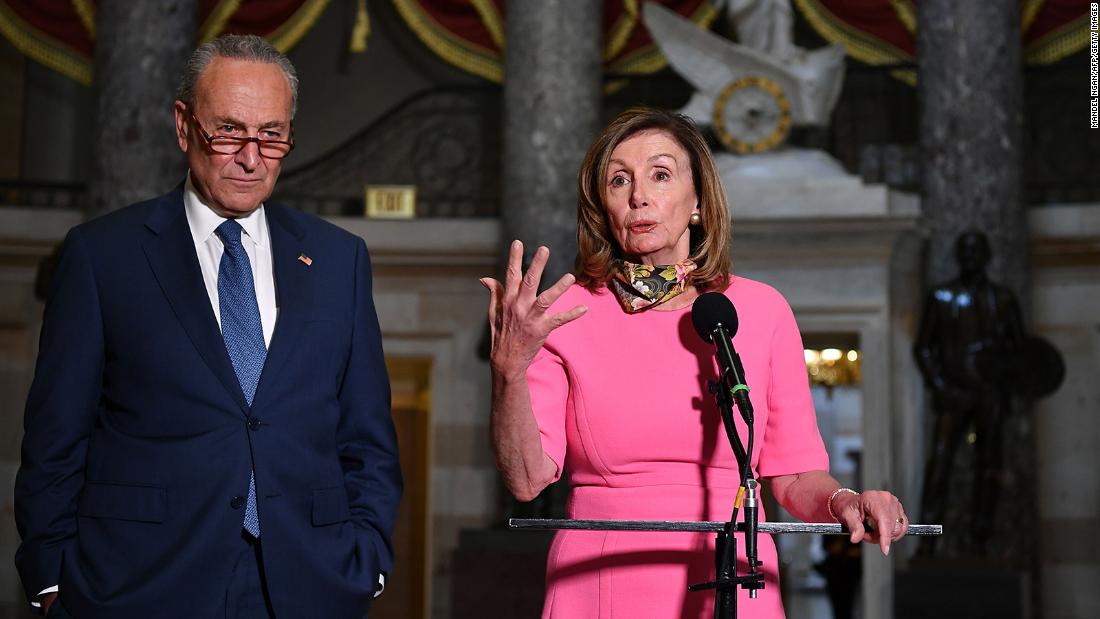Stimulus negotiations: Democrats face key choice on a slimmer deal as relief talks enter pivotal week
The decision isn’t an easy one for Democrats who rejected bigger proposals before the elections as they pushed for their own massive plan.
Congressional leaders must make decisions immediately about which provisions to include in a spending package to keep the government open past Friday, but there’s no consensus yet on how to proceed.
When CNN asked Pelosi if she’s open to dropping state and local aid as part of the relief talks, she responded: “I very much support state and local.”
Asked if the aid amounted to a red line in the talks, Pelosi said: “We are in negotiations.”
Bipartisan group expected to unveil 2-part proposal Monday
But there’s a complication: Democrats are scoffing at the $160 billion package because they believe the lawsuit protections are too sweeping, according to sources with knowledge of the discussions, and are pushing to change the proposal before details are unveiled later Monday.
Republicans in the group have endorsed the $160 billion package, but the only Democrat who has offered his backing so far is West Virginia Sen. Joe Manchin, sources said. And Republicans in the group will only get behind state and local aid — which many in their conference oppose — if there’s a deal on liability protections.
Asked Sunday if he’d be ultimately willing to drop state and local aid to get a deal, Schumer sidestepped the question.
“I’m not going to do any negotiations here in public,” Schumer said in New York. “As you know, I believe state and local aid is vital to get something done. There are lots of things that are vital to get things done, but I’m not negotiating in public.”
In a phone call with Treasury Secretary Steven Mnuchin, Pelosi once again made her case for more aid to states and cities — and pushed for changes to liability protections proposed by Republicans.
“Health care workers and first responders are risking their lives to save lives and at the same time, are at risk of losing their jobs without state and local support,” Pelosi spokesman Drew Hammill tweeted after the speaker’s 30-minute call with Mnuchin. “The Speaker reiterated her view that a compromise on the liability issue should be found that does not jeopardize workers’ safety.”
Government funding deadline Friday
Both Pelosi and McConnell have said that they want to use the omnibus bill as their legislative vehicle to carry critical relief measures after months of a stalemate in Washington and as the economic crisis continues to ravage the nation. What they ultimately decide to include remains the big question.
But the $748 billion bipartisan proposal gives the leaders a number of options to choose from. That package proposes:
- $300 billion for small business loans
- $35 billion for health care providers
- $2.6 billion for the Centers for Disease Control and Prevention for vaccine distribution and infrastructure
- $3.4 billion for grants to states and cities to help with vaccine efforts
- $7 billion for grants to states for coronavirus testing and contact tracing
- $82 billion for schools and other education providers
- $25 billion for rental assistance and an increase for food stamps
- Extends the eviction moratorium until the end of January 2021
- Extends student loan forbearance through April 2021
- Provides jobless benefits of $300 per week for 16 weeks
That $748 billion plan will be endorsed by Republicans and Democrats who are part of the bipartisan negotiating group, adding pressure to Democratic leaders to accept that plan since they have publicly endorsed the group’s efforts to find a deal. They’ll face even greater pressure if it appears to be the only measure that could be signed into law, potentially forcing them to choose between liability provisions they don’t like or dropping state and local aid altogether.
On Sunday, House Majority Leader Steny Hoyer didn’t say if he would be willing to drop state and local aid, but suggested that was a possibility.
“We need to act,” Hoyer said on CNN’s “Inside Politics.” “And acting means that we are not going to get everything we want. We think state and local is important. And if we can get that, we want to get it. But we want to get aid out to the people who are really, really struggling and are at a grave risk.”
Hoyer added: “Life’s a series of tradeoffs and give-and-takes.”
This story has been updated with additional developments Monday.
![]()


